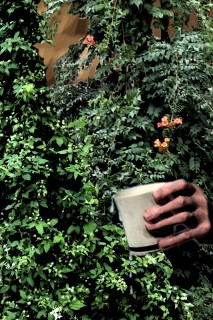[note] For some reason WordPress is destroying my line breaks. I'll have to tackle this issue when I get back to this in July. It's still readable though.. I hope [/note]
The worn cup dripped water from its mouth happily as it glittered in the sun. A hand, wizened with age, held the cup, trembling ever so slightly. Carefully, the hand, belonging to a stooped man leaning on a cane, tilted the cup forward and emptied its contents on the lush vines below.
“Grandpa, what are you doing?” pipes in a sharp, young voice, unsettling the reverie of the old man.
“Oh, hey Kiddo! I’m just helping along these little ones,” responds Grandpa.
“They don’t look they need any help, Grandpa,” reflects Kiddo.
“These big vines don’t need any help, that’s for sure; but I was watering these little guys over here because they look like they’re struggling,” says Grandpa as he negotiates a thin vine toward the sunlight.
“Hmm… I don’t know. Everything’s really thick. But it’d be awesome to build a fort here,” says Kiddo fingering the knotted mass of woody vines. Old growth is layered in such a dense display of gnarled fibers it is a wonder that anything new could grow in at all.
“Yes it would. Or even a tree house up there in that Brewhouse,” muses Grandpa as he puts the cup away in his shoulder pack.
“That’s a brew house? Grandpa, I never knew you worked here!” exclaims Kiddo.
“Me? Oh no, no. I wasn’t even alive when this was a brewery! I just knew from growing up that there used to be a lot of breweries here before this area became parking lots. Used to be, I’m afraid. Prohibition closed them down,” says Grandpa, thinking back on his life.
“Permission?”
“Prohibition. You weren’t allowed to buy alcohol.”
“Oh, you mean that smelly gasoline that Great-Aunt likes to keep in her house?”
“He-he-he,” chuckles Grandpa, “Yes, that’s it. I really don’t understand why people like that stuff,” thinking of tequila.
“Me neither,” says Kiddo, thinking of alcohol in general. “But that’s cool they turned this ruin into this kind of place with all these plants overflowing in it.”
“You think so too, eh? Yes, it brings back memories from when I was your age – adventure, new beginnings, the great unknown,” reminisces the old man. “But come on, life is not all about the past, let’s go see the Sage! I’ve been meaning to teach you the game of Go properly since I’m not good enough against you.”
“Oh, Grandpa, you’re not that bad. But I wouldn’t mind learning some new moves,” corrects Kiddo as they both amble through the overgrowth towards a clearing. All along their path they are met with plants stretching across in their twisted forms, slowing their progress. Occasionally they were met with such a thicket that they could not make their way through.
But, finding new paths was relatively effortless. The path they chose that led them to the Sage was a bramble shaped bridge that weaved over its brethren as if stamping out all the life beneath it. It was merely a facade, for the bridge supports an armature for new growth to seep in where the old had either hardened or withered away. It had the beginnings of railings reaching toward the sky, and in some places, had nearly carved a tunnel in the air.
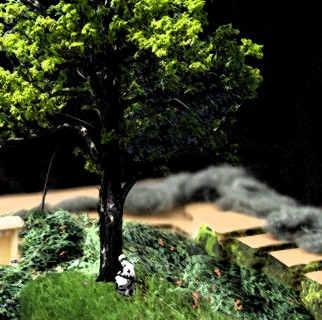
The distance to the sage was not far, but their hike toward her was laborious and slow. While seeking a path was not very challenging, finding a foothold in the growth was often difficult. It taught them to be appropriately cautious and to pick their way through slowly. It allowed them the opportunity to see their environment with detail not possible at quicker paces. This excited Kiddo with a sense of adventure and it did not bother Grandpa because the occasion provided for both spending time with his grandson as well as seeking answers to his own thoughts.
It was necessary to stop a few times: Grandpa needed rest, but he wisely used the occasion to show Kiddo something new on their journey. Once, they spotted what looked like a beetle, but its back was flat with the color of a new growth leaf. If the creature hadn’t been basking in the sun on a weathered brick they would have missed seeing it entirely.
“’Why does the enlightened man not stand on his feet and explain himself?’” spoke a disembodied voice from the overgrowth.
“That’s a good question, Sage, seeing as how you’re sitting in the grass,” notes Grandpa as the Sage had indeed been sitting on a compacted circle of grass, surrounded by a two foot high meadow. The Sage chuckled at this retort but made no move to shift her position. Instead, she motioned for the two of them to sit by her. It was at this time that Grandpa noticed the Sage had been talking to two college students before they arrived; he just caught sight of them before they disappeared into the overgrowth.
“And what did we learn of the landscape today, Kiddo?” prods the Sage.
“There are all these awesome hiding places in here!” says Kiddo excitedly. He notices Grandpa’s raised eyebrow, blushes, and then sheepishly continues: “I guess what I mean to say is that there’s more hidden spaces in here than out in a regular forest. It’s like the plants are naturally occurring but unnatural at the same time. I mean, where can you walk on plants in thin air in a forest?”
“Ah, yes, very good. It would seem that the vines naturally started growing here years ago, but it also seems that it is impossible because why does this not happen elsewhere in the city? It helps a great deal to leave this place well alone. That’s when plants take the opportunity to take over a place when humans aren’t regularly occupying it. But, I’ll you a secret: this ruin we’re sitting in, it was actually designed to be this way,” explains the Sage knowingly.
“Wha- wait, wait, wait, you mean… someone actually built this place?” asks a dumbfound Kiddo.
“Not so much built as intervened. You see, the building was eventually going to decay when abandoned, so this place was designed for ‘managed decay.’”
“What’y’da mean? This place was going to fall apart so someone just let it happen? It sure doesn’t look that way with all these plants.”
“Yes and no. This place was going to fall apart, yes, but it was designed to fall apart in a certain way that allowed for these plants, this growth, to happen. And not just to randomly grow everywhere, but to grow in certain ways – some plants faster, but weaker, and other plants slower, but stronger. The faster plants are the pioneers, they conquer the territory but they fight against each other. They grow so fast that each generation of plant growth gets taken over by the next generation. The generation on the bottom dies out, yes, but eventually this successive layering 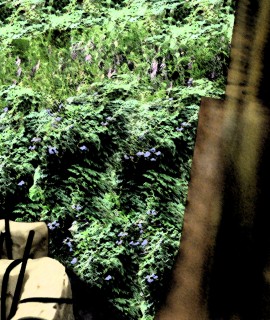
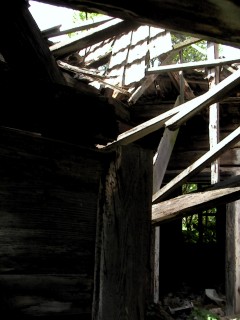

creates a mat, a foothold, for the slow but strong vines to come in and mold such things as that bridge you walked on to get here,” details the Sage.
“Wow, Sage, you know so much! Do you know who made this?” Kiddo asks wonderingly.
“Yes, I happen to know the landscape architect who designed this. He first proposed it years ago in his master’s thesis,” admitted the Sage.
“What’s a landscape architect?”
“Oh-ho. That’s a discussion we’ll save for another time. But, for now, think of them as being creators of lush landscapes such as this one.”
“Wow. Grandpa, Grandpa, do you think I can be a landscape architect when I grow up?” asks Kiddo tugging on Grandpa’s sleeve. Grandpa smiles and says, “Sure. Of course you can. You already have a good eye, and that’s something you need for the profession. I would have walked right past that beetle if you hadn’t pointed it out.”
“But this kind of overabundant growth doesn’t happen naturally in a landscape,” continues the Sage. “You can consider that decay is as much growth as it is a destructive power. We never think of it this way, but, the growth of bacteria and organisms that break things down is one part of the decay that happens here. Even though things are dying, other things are living at their expense. It’s what the landscape architect termed as ‘overgrowth.’”
“Overgrowth?”
“Yes, what he really meant is that there is no such thing as decay or growth. There is simply only overgrowth. If you allowed a thing to keep growing, with no limits, you would eventually happen upon that thing as a gigantic, unmanageable entity. So, for ‘decay’, all these buildings around us would cave in on themselves, and that would be the result of overgrowth. To make that happen, it may have to take layers of overgrowth, I believe he termed it as ‘stratified overgrowth’, so that might mean wind, water, structure settling and plant overgrowth to successfully ‘decay’ the building. And the same thing would happen with ‘growth’; all these vines around us are proof of that.”
“I don’t really get it though. How are wind and water overgrowth?” ponders Kiddo.
“Normally, we human beings maintain what we build and what we live in or live around. If we let that go, then nature takes over and things become like a jungle. Given enough time, the landscape regenerates itself and what looks like a pile of rocks may have been a building hundreds of years ago. An example of water overgrowth would be...” the Sage stops while taking a look about the site. She finds what she is looking for and continues, “Look there. Do you see that brick wall? The mortar that holds the bricks together is made from a material that will wash out faster than the brick, if water were allowed to wash over it. Normally this never happens, because, if you were a landscape architect,” the Sage smiles in Kiddo’s direction,” you would know to never direct water towards a building.”
“Really? What can a few raindrops do to a building?” Kiddo asks skeptically.
“Mmm. More than you might think. Water by itself doesn’t look threatening, but as you know, it gets heavy when in a gallon jug. When you multiply that

weight when there’s a lot of water from a storm, suddenly that solid brick wall starts to look vulnerable. Additionally, water by itself, and, with the help of carrying suspended materials like sand, can grind down substances. An example of this would be those smooth stones and shells at the beach.”
“Oh yeah, that’s true,” thinks Kiddo as that makes sense. Grandpa, remembering that they came here to learn Go, decides to interject in the lull of conversation. “Heh. Well, Kiddo, that’s a lot to think about. Who knew you could learn so much in such a small space and in such a short amount of time—.”
“Yes, yes, Grandpa, I remember why the two of you came, but it looks like Kiddo still has something to say on the subject,” interrupts the Sage. “What is it Kiddo?”
“Oh, well, um… I just wish school could be like this,” mumbles Kiddo. Surprised, Grandpa says, “School? How many times have I heard you say that school is boring?”
“Well, yes, I mean no. Err… What I mean is… I wish school could be outside in these twisty bushes. There’s so much to explore and it’s so much more exciting than sitting in a chair in front of the blackboard,” responds a visibly flustered Kiddo.
“Haha, Kiddo, don’t worry, we won’t tell anyone that you can actually enjoy school if it was in such a lush outdoor setting. I think, Grandpa, that Kiddo can also be referring to the interpersonal format of our discussions today. They are considerably different from the often dry facts one learns in school. At the very least, it teaches the context of what one is discussing,” realizes the Sage as she turns from focusing on Kiddo to Grandpa. “But, I think now is the time to focus our attention on something really fun! What do you say to a game of Go, yes?”
***
Dry leaves crunched underfoot as the two college girls searched for footholds on the sinuously bulging vine. The knotted vine was crouched against the wall, but the very top of it straddled the brick wall of the brewery’s two story office building. It was not perfectly vertical, however, and it had the appearance of continuing on into the sporadic clouds far above. Somehow during its obviously many years of growth, the vine had managed to use the site’s constructed rubble as leverage while pursuing the remains of older vines that had died away. The girls had thought for a while on how to climb up the vine. They could run up the vine as the slope was not impossible to traverse, but, in the end they welcomed the challenge and decided to err on the side of caution by taking it slow.
“This—this definitely,” pants the first girl, “…definitely beats the rock wall at Northeastern.”
“Heh. Getting— Getting tired already? You need to – umph – work on those muscles if you want to catch the eye of that guy you like,” counters the second girl.
“Who—what? Wait, you know about him!?” exclaims the first girl.
“Haha. Who doesn’t? You’re practically drooling over him whenever he’s around!” teases Second.
“Shut up! Argh… I’ll race you to the top and prove it to you that I’m more athletically fit than you are!” challenges First. “Alright, you’re on,” responds Second as she moves to block First from gaining on her.
When the two girls finish elbowing each other up to the top of the vine, all in good fun, what they saw next took their breath away. It was as if the brewery had been dropped in a frothing sea of greens, reds, yellows, and purples. Bobbing up from the surface, the colors had dripped from the walls, walls barely indicative of their storied, constructed past.
In front of them lay the continuation of vine, which, upon closer inspection, was instead a tight bundle of many vines, and not a singular vine as it appeared on the ground. Down below, to the right of them, sat the Sage with an old man and a child. Further afield, they could see the parking lots with their cracked asphalt. What they could not see on the ground while walking on that cracked asphalt, however, was the apparent swath of vegetation making its way through the lot. It was as if thousands of tiny chasms had opened in the earth, sprouting new macroscopic forests of groundcover.
A sudden movement on their left, on the far side of the bundled vine, brought the girls’ attention back to the Brewhouse. The vine led to an open window, its glass long gone. The girls looked at each other, nodded, and made their way carefully across the vine, suspended two stories in the air.
Stepping through the aperture of the window, the girls stopped to adjust to the dimmer light inside the Brewhouse. As their eyes became accustomed to the shadows, they noticed a dark shape to their side. A shape that moved, causing First to shriek in fright.
“Whoa! Hey—it’s alright, it’s alright. Sorry, I didn’t mean to startle you. It’s just this space is fantastic for thinking and I’m so close to—“ began a deep voice penetrating from the mysterious depths. The man takes a step forward, coming into more light. It is then that the girls notice his bedraggled appearance, his unkempt hair and beard, and the slight wild look in eyes.
Alarmed, Second quickly finds a piece of rubble and picks it up, holding it defensively. “Who—Who are you? You’re not one of those wierdos who prey on unsuspecting college girls, are you? ‘Cuz if you are, I’m not afraid of beating you to a pulp!” challenges Second, as First scuttles behind her, admiring her boldness.
The man claps his hands together and exclaims, “Oh! Women! Yes, I forgot about those! Oh, that’s a great idea!”
“Um, you’re not helping your street cred there, buddy,” says Second wryly.
“Oh, er… Yes, I could see how that would be a problem,” responds the man sheepishly. He continues with a gestural flourish, “Pardon my appearance, ladies, but I have been so smitten with this place recently that I have entirely neglected my usually impeccable appearance. You see, I am a poet and philosopher by training.”
“That’s awfully formal of you to say. Do you go to Northeastern?” returns Second, skeptically.
“Well, not exactly. I’m working on my doctorate in perspectivism, and my schedule is such that I often, well… forget that I am here in this space,” laughs the Poet. At this, both girls relax somewhat and take in more of their surroundings. First nearly trips on a knotted vine as she leaves Second’s side.
“Careful there! There’s about six to ten inches of plant matter where you’re standing, but that’s no guarantee. I’ve stepped in quite a few holes here myself where there’s nothing separating me from a two story drop below,” cautioned the Poet.
“Yeah, thanks, good to know. So, um, what else goes on in here besides climbing these vines?” asks First timidly. Just then, a heavy thud and a muffled chorus of voices erupted below them. Everyone jumped, and First shrieked again.
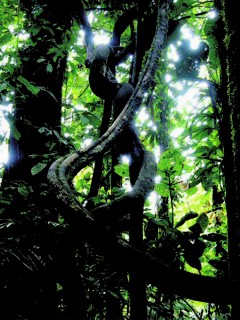
“Eeek!!! What was that?”
“That would be the Seed Bombers Guild. Well, they don’t do as much seed bombing as they used to, so now it’s just mostly training, cutting and supporting vines to make new vegetative rooms and floors. There is a rumor that they participate in guerilla seed bombing across the city though. I guess that wouldn’t be illegal but is it ethical? Would throwing seeds around be littering? Who knows,” said the Poet.
“What do you mean, that they create new vegetative rooms?” asks First.
“As you’ve probably realized, this kind of growth – growth that we’re standing on – is not something spontaneously created. It was designed to be this way. So there used to be wood floors and supports in this building, but as they rotted away, the vines had the opportunity to take over, to take their place. In a way, the idea of a floor, walls, and supporting columns were displaced. They used have form, but then became formless when the material decayed. The plants used to be formless, until they gained form when they grew over that decaying, constructed material. They essentially replaced what was physically constructed through parasitic destruction to become a wall or a floor that is physically grown. Does that make sense?” said Poet.
“Somewhat, but what do you mean that the material that used to constitute the building became formless?” asked First.
“It became rubble. That’s what I meant by saying it was displaced. A brick wall will become a pile of rubble. It gets displaced in such a way that the material remains largely the same, only its context changes. But for the vines to dominate the space, they need the ‘ladder’ of the brick wall before it falls apart through their growth. To use an analogy, the plant overgrowth you see here is a lot like seed germination. The seedling that will emerge can be considered to be overgrowth, and the tissue that the plant initially uses as food to grow itself out of the soil is the ruined building. Eventually, the ruined building will be consumed that the shell of the building – brick, wood, ironwork – will all deteriorate or fall to the ground and the plants will cover and replace the shell so it becomes the core the supports new growth,” said the Poet, gesturing around the space as he talked.
“Hmm… interesting,” said Second. The conversation seemed to answer all of their questions. “First, do you want to check out those seed bombers?”
“Yeah, sure. Um, Poet, do you wanna come too?”
“Yes, I would like that. I think it’s time for a change of pace,” answered the Poet.
***
When the trio arrived at the base of the Brewhouse, they discovered a ring of about 15 people around a broken beam that lay across a depression in the ground. It was apparent that it once had a different physical orientation. Nearby lay some planks and metal sheets. At their arrival, one of these people, an energetic young man appearing to be of college age, beckoned to them to come closer.
“Welcome, welcome! Did the Sage tell you about us?” began the young man.
First shook her head while Second said, “No, we heard a loud noise and Poet told us what you do though I don’t know why you do it.”
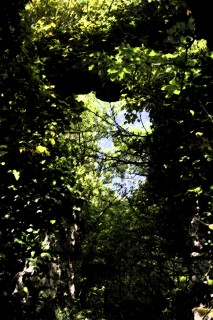
“Poet!!! Haha! Going for the John Muir look?” calls out the young man.
“No, I think it’s high time to go back to the Bruce Campbell look. Especially with seeing your minions here, Leader!” grins Poet.
“Oi, oi. Don’t be comparing us to Army of Darkness now,” laughs Leader. “As for what and why we’re doing it, I think I can answer that for you. See, this beam that just fell is going to be holding up our dance floor.”
“Dance floor?”
“Heh. I hope Poet didn’t tell you that we’re a bunch of plant-worshipping, new-age druids, did he? Err, not that there’s anything wrong with that,” added Leader hastily. “But, we’re normal college students like everyone else, though with some probably unique tastes. Anyway, we’re making a dance floor so we can open this place up for a green-living charity dance party this weekend,” said Leader as he crouched down to the edge of the depression. “This hole is going to be filled with water from the cistern and the dance floor will go over it. We’re hoping that’ll be enough to create some rockin’ reverb. And then the speakers will be hidden in the overgrowth and we’ll hang lights from the vines. I’m thinking that this is gonna be kick-ass.” Cheers from the rest of the crew erupted at this last statement.
“Alright, that sounds cool,” said Second while First peered over the edge into the hole. “Do you guys do this kind of thing often?”
Leader looked around at everyone before he spoke, “I think we do it often it enough. It usually happens because something’s changed on the site rather than we deciding to put something here. Like this columnar space was created recently when this beam cracked in half and took down a crapload of vines with it.”
“Isn’t doing these kinds of things dangerous?” asked First.
“Well, yeah, there’s naturally a good amount of danger building and destroying things. But I guess that’s one of the draws to this place – it’s like a blank slate that keeps evolving, keeps growing and decaying, but it has a kind of structural logic that’s incomprehensible yet strangely gratifying at the same time. And somehow, living, playing on the edge like this is just really refreshing,” explained Leader.
“Yeah, and the fear that you may get in here prompts a different brain response than if we were setting this up on a grassy field. It’s so crazy in here that our brains keep trying to rationalize everything. So we end up building this dance floor differently than in any other context,” interjected someone from the crew.
“Oh, that’s cool,” said First as she looked at Second. Second smiled wickedly and said, “Sounds like my kind of thing! We’ll help you out; we can skip going to the gym altogether before we go out later, right First?”
“Um, right,” responds First. Second rolls her eyes and then smacks First hard on the back. “Come on! Show some enthusiasm for once! I’ll invite you-know-who tonight...” winks Second, smiling knowingly.
“Alright, alright! Let’s let ‘er rip!” exclaims First, pumping her first into the air.
“Um, I think some of their creepiness is rubbing off on you, First,” smirks Second.
“Haha, as long as you care we don’t mind if you’re a little oddball!” laughs the Poet. He continues, “After all, who makes a druid dance hall in the middle of a city?!”
